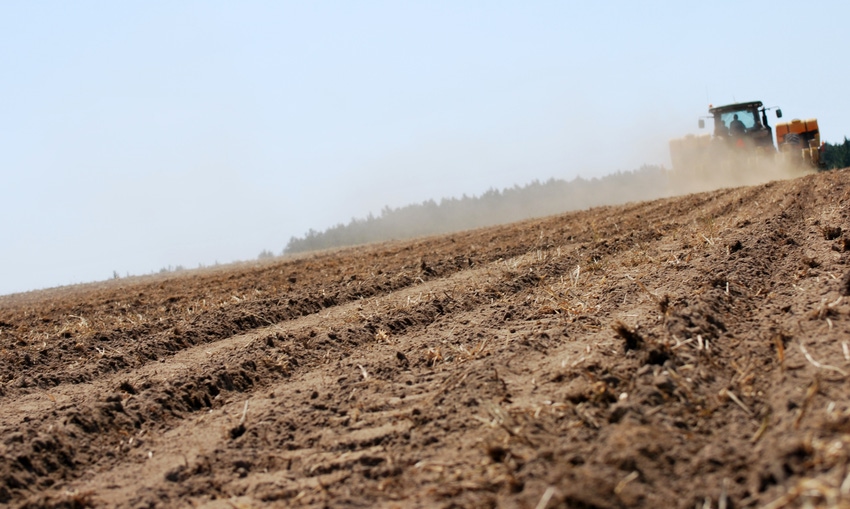
Some Alabama farmers were waiting on rain while farmers in Tennessee and North Carolina were hoping the rain would ease, as drought and flooding combined to hinder the start to the Southeast row crop season.
About 90 percent of Alabama was officially in drought as May rolled in, a dry situation farmers have dealt with since last summer.
“Much needed rain fell at the end of the week (of April 27). Cotton, soybean, and peanut planting is well underway. Some very windy days hindered spray activity on corn,” says Jeffrey Smith in Elmore County, Ala., just north of Montgomery in the May 1 Alabama Crop and Conditions Report.
William Birdsong, Alabama Extension crops specialist in the Alabama's Wiregrass region, said rain is needed to really kick off the planting season. “Dry soil conditions have hindered planting here as well,” he said in an Alabama Extension release. “The planted corn looks very good and farmers are spraying to control weeds. Producers are also making fertilizer applications.”
7 tips for successful cotton planting
Most of the corn in southeast Alabama is irrigated, and farmers have already begun watering. Birdsong said very little cotton and peanuts have been planted. “The longer the delay, the more critical conditions will get,” he said. “The soil temperature is good again, but producers need moisture in order to begin planting.”
Most of Georgia’s primary row-crop regions are in mild to severe drought, too. “Peanut and cotton planting is in full swing. Irrigated acres are taking priority as many producers are waiting for adequate rainfall to provide moisture for dryland fields. Corn is growing well with the current weather, but it is beginning to show signs of stress from the lack of subsoil moisture. All crops and pastures need rain,” said Brock Ward, University of Georgia Extension agent in Miller County located in southwest Georgia, in the May 1 USDA crop update.
Cotton and peanut planting in Florida is progressing slowly in areas with enough soil moisture. Most counties have reported that producers are still waiting to plant, according to USDA report.
Sidedressing corn after heavy early season rain
According to Tennessee Agricultural Statistics Office May 1 report, “Rains continued last week, keeping most farmers out of their fields. Corn, cotton, and soybean planting remained on hold as farmers waited for the rains to stop. Tobacco plants were ready to be transplanted, but producers were unable to get into the fields due to excessive moisture. The rains did improve pasture and hay conditions, but many hay fields were short due to the adverse effects of last year’s drought.”
"Excess rainfall has put corn planting about 2 weeks behind on upland fields. Field prep for tobacco setting is also running behind schedule," says Ronnie Barron, University of Tennessee Extension agent in Cheatham County just west of Nashville.
"Corn planting continues after heavy rains last weekend. Some river bottoms will need to be replanted due to standing water over recently planted fields. Hay fields are looking better after the recent rains but hay growth looks a little short at this time due to a relatively dry spring," says Richard Groce, UT Extension agent in Maury County in central Tennessee.
"3.9 inches of rain this week (of April 27). We are behind on getting corn and beans planted due to soil moisture. Cool season grass hay is nearly ready to cut. Johnson grass is already coming up! Lots of wheat has lodged due to storms this week," says John Goddard, UT Extension agent Loudon County located near the North Carolina line.
Excessive rain has caused problems in North Carolina, too.
"Rainfall totals across Lee county reportedly ranged from 4-5 inches. Approximately 70 percent of the tobacco crop had been set before the rain event. Leaching adjustments will be needed. Weed control will be a concern as many PRE herbicides have likely leached," says Zachary Taylor, NC State Extension agent in Lee County about 30 miles southwest of Raleigh, in NC Agricultural Statistics Service May 1 report.
"Rainfall ranging from 3-7 inches delayed all field work. Rising river water may flood isolated fields in coming days. Only a small percentage of tobacco transplanted so the impact is small. In contrast, corn already showing signs of poor growth (low nitrogen and/or sulfur along with saturated soil conditions) in isolated spots,” says Mike Carroll, NC State Extension agent in Craven County located on the coast.
But the six inches of rain received in Person County, NC, on the Virginia line “was needed,” says Gary Cross, the county’s NC Extension agent.
About the Author(s)
You May Also Like






